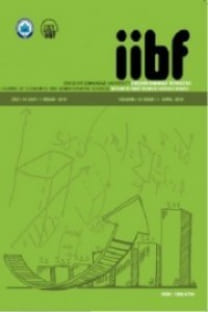Tüketicilerin Helal Ürünler Hakkındaki Algılama, Tutum ve Beklentilerini Tespit Etmeye Yönelik Bir Araştırma
Tüketicilerin satın alma kararına etki eden birçok faktör bulunmaktadır. Bunlardan biri de kültürel faktörler içinde sayılan dini inançlardır. Tüketiciler ürün satın alırken dini inançlarının etkisi altında kalarak karar verebilmektedirler. Bu noktada helal ürün kavramı önem kazanmaktadır. Bu çalışmanın amacı, tüketicilerin helal ürünler hakkındaki algılama, tutum ve beklentilerini ve bu algılama, tutum ve beklentilerin tüketicilerin sosyo-demografik özelliklerine göre farklılaşıp farklılaşmadığını tespit etmektir. Bu amaçla Yozgat il merkezinde yaşayan tüketiciler üzerinde bir anket çalışması yapılmıştır. Toplanan verilerin analizinde ortalamalar, standart sapmalar, güvenilirlik analizi, faktör analizi ve Tek Yönlü MANOVA kullanılmıştır. Yapılan analizler sonucunda, tüketicilerin helal ürünler hakkındaki algılama, tutum, beklentileri tespit edilmiş, bu amaçla hazırlanan ölçekteki ifadelerin sekiz boyutta toplanabileceği ve boyutlar itibarıyla tüketicilerin algılama, tutum ve beklentilerinin cinsiyet, öğrenim durumu, meslek ve gelirlerine göre farklılık gösterdiği, yaş ve medeni duruma göre ise farklılık göstermediği ortaya çıkmıştır.
Anahtar Kelimeler:
Helal Ürün, Helal Gıda, Helal Ürünler Hakkındaki Algılama Tutum ve Beklentiler
-
There are many factors influencing consumer purchase decision. One of them is religious belief which is regarded as a cultural factor. Consumers may be influenced by their religious beliefs while purchasing products. At this point, the notion halal product has become an important issue. The aim of this study is to examine consumers’ perceptions, attitudes and expectations towards halal products, and to determine whether these perceptions, attitudes and expectations vary according to consumer demographics. For this purpose, consumers who live in Yozgat city center are surveyed. Means, standard deviations, reliability analysis, factor analysis and one way MANOVA are used to analyze the obtained data. Based on the results, consumers’ perceptions, attitudes and expectations towards halal products are measured. The findings show that the measurement scale consists of eight factors. The findings also demonstrate that consumers’ perceptions, attitudes and expectations towards halal products differ in terms of gender, educational background, occupation and income, and does not differ in terms of in age and marital status.
___
- Antonopoulou L., Papadas C.T., ve Targoutzidis A.(2009), “The Impact Of SocioDemographic Factors And Political Perceptions On Consumer Attitudes Towards Genetically Modified Foods:An Econometric Investigation”, Agricultural Economics Review, 10 (2), 89-103.
- Aziz A. A., Amin M. ve Isa Z., (2010), “The Perception To Choose Halal Cosmetics Products: An Empirical Study For Malaysian Consumer”, ICBME’10 (6th. International Conference on Business, Management and Economoics), http://icbme.yasar.edu.tr/previous_conferences/2010/eproceeding/Azmi_AbdAziz.pdf, (Erişim: 15.05.2013
- Aziz Y. A. ve Chok N. V. (2013), “The Role of Halal Awareness, Halal Certification, and Marketing Components in Determining Halal Purchase Intention Among NonMuslims in Malaysia: A Structural Equation Modeling Approach”, Journal of International Food & Agribusiness Marketing, 25, 1-23.
- Dali N. R. S. B. M., Nooh M. N. B., Nawai N. B. ve Mohammad H. B., (2008) “Is Halal Products Are More Expensive As Perceived By The Consumers? Muslimprenuers Challenges And Opportunities In Establishing A Blue Ocean Playing Field”, Proceedings of International Conference on Entreprenuership: Towards Developing Entreprenuership Society, 27-28 May at Meritus Pelangi Beach Resort & Spa Langkawi.
- Essoo N. ve Dibb. S. (2004), “Religious Influences on Shopping Behaviour: An Exploratory Study”, Journal of Marketing Management, 20, 683-712.
- Hamdan H., Issa Z. M., Abu N. ve Jusoff K. (2013), “Purchasing Decisions Among Muslim Consumers of Processed Halal Food Products”, Journal of Food Products Marketing, 19, 54-61. http://belge.tse.org.tr/genel/firmaarama.aspx?belgeturuid=42, (Erişim:16.07.2013). http://tuikapp.tuik.gov.tr/adnksdagitapp/adnks.zul, (Erişim: 08.07.2013). http://www.gimdes.org, (Erişim:16.07.2013). http://www.helaldenetim.com, (Erişim:16.07.2013). http://www.ifanca.org/cms/wpages/detail/4ca47c89-ec4c-41ba-ac381c111b830f0c, (Erişim: 11.07.2013). http://www.tdk.gov.tr/index.php?option=com_gts&arama=gts&guid=TDK.GTS.51 de7826d5a9a4.64591010, (Erişim:11.07.2013). http://www.tse.org.tr/haberler/2011/12/27/helalgida, (Erişim:16.07.2013).
- ISSN: 1306-6730
- Yayın Aralığı: Yılda 3 Sayı
- Başlangıç: 2006
- Yayıncı: Eskişehir Osmangazi Üniversitesi İktisadi ve İdari Bilimler Fakültesi
Sayıdaki Diğer Makaleler
Firma Değerlemesinde İndirgenmiş Nakit Akımları Yöntemi: BIST Elektrik Endeksinde Bir Uygulama
Semih OKUTAN, Buket BORA, Remzi ALTUNIŞIK
Ülkelerarası Büyüme Farklılıklarının Açıklanmasında Kurumsal Yapının Rolü: Panel Veri Analizi
Seyfettin ARTAN, Pınar HAYALOĞLU
Türkiye'de Phillips Eğrisi Üzerine Bir Uygulama
Osman Cenk KANCA, Metin BAYRAK
Avrupa Birliği Yönetiminde Belgelere Erişim Hakkının Gelişimi
Türkiye’de Phillips Eğrisi Üzerine Bir Uygulama
Metin BAYRAK, Osman Cenk KANCA
Gelişmekte Olan Ülkelerde Küreselleşmenin Yoksulluk ve Gelir Eşitsizliği Üzerindeki Etkileri
Ramazan KURTOĞLU, Behiye ÇİÇEK
Satın Alma Gücü Paritesinin Geçerliliğinin Test Edilmesi: Zaman Serisi ve Panel Veri Analizi
